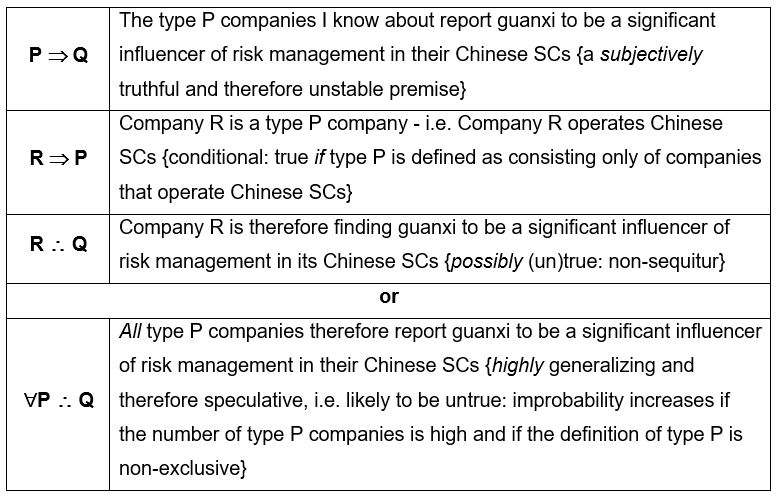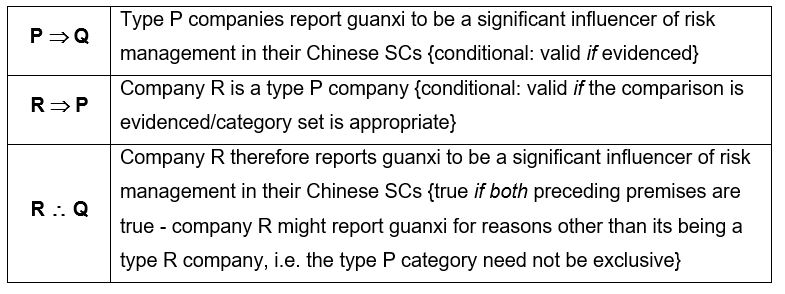Testing Research Logics
The following tables provide an approximate account of the logical options that were potentially applicable to this research design, and an evaluation of the sequential statements within each.
Inductive Logic: Specific to General [1]

The above describes an unqualified inductivist logical process. The first premise (statement) represents a subjective truth: it accurately reflects the researcher’s personal opinion (generated by experience in industry) but is not necessarily an independently verifiable reality, so is therefore compromised. The validity of the second statement is contingent on the first and definitional conditions. Because both premises are vulnerable, both conclusions were precarious.
Deductive Logic: General to Specific

Since the phenomenon under scrutiny (guanxi as a facilitator of SC risk management) has yet to be empirically examined, the first premise could not be deemed valid; subsequently nor could the second. Any conclusions drawn thereon would be speculative. The deductive process was unsuitable for conducting and extending this research. Deductive logic could be discarded since the robustness of its conclusions is dependent on pre-existing theory and/or empirically supported premises.
Abductive Logic: General to Specific to General

Abductive logic can also be rejected, because its conclusions would not have been informative to the research and its logic unproductively circular. If, however, disambiguation on the taxonomy of the companies under scrutiny were a priority, abduction could be useful.
When seeking to develop theory – rather than graft existing theory onto novel observations – the inductivist’s approach is fitting. Hence, my research required modification of both premises and resultant conclusion, thus:
Qualified Inductive Logic

The above qualified inductivist reasoning process supports a narrow, but qualified conclusion, and is therefore the optimum logical framework for this research design.
All the above logic statements are synthetic in the Kantian sense – all predicates supply meaning and/or conditionality. Synthetic statements are refutable and therefore falsifiable in the Popperian definition. The synthetic nature of the logical premises steering the research design reflect the contingent (qualified) nature of the inductive premises. Were the premises logically otherwise, i.e. analytic, the project would be conceptually redundant, as all premises would be logically circular and unfalsifiable, rendering testing impossible: e.g. The companies I studied (all of whom reported guanxi to be a significant influencer of SC risk management) all reported guanxi to be a significant influencer of risk management.). A synthetic, falsifiable premise/hypothesis might be thus: Companies managing Chinese SCs will report guanxi to be a significant influencer of risk management in those SCs.
Although this study was non-positivist so did not employ hypotheses, the preceding statement encapsulated the research logic and epistemological ambition of the project.
[1] These tables are not intended to provide full accounts of their respective logics, nor are they intended to suggest that logics are definitively explicable in such simplified terms. The contribution of probability is purposefully omitted, because its complexity exceeds the scope of the present work.
